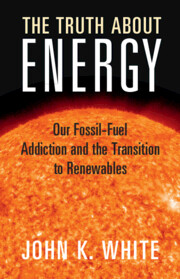The Truth About Energy: Our fossil-fuel addiction and the transition to renewables
John K. White
Softcover, 720 pages, Cambridge University Press (2024)
We are at the beginning of a revolution, as profound as the IT revolution and the advent of the microchip in the 1960s.
The ET or Energy Technology revolution isn't advancing as fast or as easily, however, with an entrenched carbon economy still at the forefront of everyday use, led by an old-world, fossil-fuel industry, despite decreasing oil supplies and the increasing consequences of harmful emissions.
Institutional change comes slowly. Revolutions are disruptive. They change everything.
Contents
1. Wood to Coal: A Short History of the Industrial Revolution
Harnessing steam for lifting and locomotion, the energy pioneers (Newcomen, Watt, Trevithick, Stephenson, Rumford, Joule, Carnot), fuel to burn (wood, peat, biomass, coal), the first global industrial economy, the heat engine and power
2. Oil and Gas: Twentieth Century Prosperity
Colonel Drake and Titusville, John D. Rockefeller and Standard Oil, the internal combustion engine and the auto industry, the quest for more, the Saudi connection, hydrocarbons and the dark sides to oil, the global oil economy, modern extraction (offshore, fracking, oil sands, M. King Hubbert and Peak Oil
3. The Nuclear World: Atoms for Peace
Fission reactions and the bomb, atoms for peace, half-lives and waste management, nuclear dangers (Mayak, Windscale, Three Mile Island, Chernobyl, Fukushima), can nuclear coexist with green industry to reduce carbon emissions?, fusion and the future
4. Old to New: The Sun and all its glory
Solar basics, a short history of solar power, it's a silicon world, the photovoltaic solar cell (silicon wafers, thin-film, third-gen), utility-scale solar power (PV and CSP), Germany's revolutionary renewables economy and beyond
5. The Old becomes New Again: More Sustainable Energy
Wind (onshore/offshore), geothermal (the hot earth rises), hydro (dams, tidal, wave), the grid (old to new), virtual power plants, batteries (Zn-Mn, PbA, NiMH, Li-ion, ....)
6. Driving the Revolution Revolution: From Volta to Tesla and back
Electric cars, the revolution revolution, autonomous driving, energy storage (more than just batteries), a whole new way of thinking, an even smarter grid (V2G)
7. Rethink, Rebuild, Rewire
Energy efficiency and conservation in the home (kilowatt hours and costs), taking it to the street, local green solutions (the traditional three Rs and other energy-saving tips), calculating our carbon footprint to promote simple sustainability (less is more), rooftop solar and off-grid setup, get involved
Some questions answered in The Truth About Energy
What type of radiation is heat? •
Why was James Watt's steam engine unique? •
Is all coal the same? •
Where was the first commercial electric-generating station and who built it? •
How is petroleum separated into components and what is the difference between petrol/gasoline and diesel? •
How rich were John D. Rockefeller, Henry Ford, and J. Paul Getty? •
What is the difference between conventional and unconventional oil? •
How much oil is in controlled by OPEC and what is "peak" oil? •
What is the difference between natural, enriched, weapons-grade, and depleted uranium? •
Should be worried about Chernobyl and Fukushima? •
Where does all the nuclear waste go? •
Why does the temperature in a tokamak need to be 10 times that of the sun's core? •
Who made the first functional solar cell? •
What is the difference between a solar cell and a light-emitting diode (LED)? •
What is the difference between a PV and a CSP solar installation? •
Where is the world's largest solar farm? •
Where are the world's largest onshore and offshore wind farms? •
When and where was the first geothermal power plant? •
Is hydroelectric power green? •
Why did Nikola Tesla originally use AC current? •
Which company was the first to use computer batteries for cars? •
What is VPP and V2G? •
Can we power a house from a car? •
Why is lithium salt ("white petroleum") in such demand? •
Will cutting down on plastic reduce petroleum use? •
Can we make a difference to global warming from more conservation in the home?
The Truth About Energy: Our fossil-fuel addiction and the transition to renewables
John K. White
Softcover, 720 pages, Cambridge University Press (2024)
We are at the beginning of a revolution, as profound as the IT revolution and the advent of the microchip in the 1960s.
The ET or Energy Technology revolution isn't advancing as fast or as easily, however, with an entrenched carbon economy still at the forefront of everyday use, led by an old-world, fossil-fuel industry, despite decreasing oil supplies and the increasing consequences of harmful emissions.
Institutional change comes slowly. Revolutions are disruptive. They change everything.

